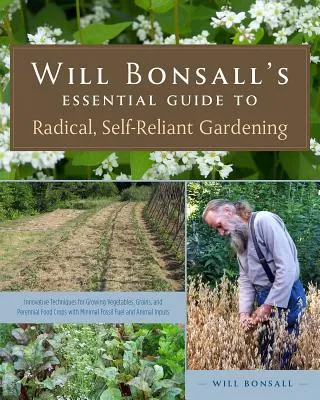Home
Will Bonsall's Essential Guide to Radical, Self-Reliant Gardening: Innovative Techniques for Growing Vegetables, Grains, and Perennial Food Crops with Minimal Fossil Fuel and Animal Inputs
Loading Inventory...
Barnes and Noble
Will Bonsall's Essential Guide to Radical, Self-Reliant Gardening: Innovative Techniques for Growing Vegetables, Grains, and Perennial Food Crops with Minimal Fossil Fuel and Animal Inputs
Current price: $39.95


Barnes and Noble
Will Bonsall's Essential Guide to Radical, Self-Reliant Gardening: Innovative Techniques for Growing Vegetables, Grains, and Perennial Food Crops with Minimal Fossil Fuel and Animal Inputs
Current price: $39.95
Loading Inventory...
Size: OS
*Product Information may vary - to confirm product availability, pricing, and additional information please contact Barnes and Noble
"If you wish to live well and eat well no matter what is going on in the rest of the world, this book is for you. . . . Will Bonsall will help you enjoy the good life under any and all conditions."—Eliot Coleman, author of
The New Organic Grower
"Society does not generally expect its farmers to be visionaries." Perhaps not, but longtime Maine farmer and homesteader Will Bonsall does possess a unique clarity of vision that extends all the way from the finer points of soil fertility and seed saving to exploring how we can transform civilization and make our world a better, more resilient place.
In
Will Bonsall's Essential Guide to Radical, Self-Reliant Gardening
, Bonsall maintains that to achieve real wealth we first need to understand the economy of the land, to realize that things that might make sense economically don't always make sense ecologically, and vice versa. The marketplace distorts our values, and our modern dependence on petroleum in particular presents a serious barrier to creating a truly sustainable agriculture.
For him the solution is, first and foremost, greater self-reliance, especially in the areas of food and energy. By avoiding any off-farm inputs (fertilizers, minerals, and animal manures), Bonsall has learned how to practice a purely veganic, or plant-based, agriculture—not from a strictly moralistic or philosophical perspective, but because it makes good business sense: spend less instead of making more.
What this means in practical terms is that Bonsall draws upon the fertility of on-farm plant materials: compost, green manures, perennial grasses, and forest products like leaves and ramial wood chips. And he grows and harvests a diversity of crops from both cultivated and perennial plants: vegetables, grains, pulses, oilseeds, fruits and nuts—even uncommon but useful permaculture plants like groundnut (
Apios
).
Inside
you'll also find:
Milling, baking and sprouting
Freezing and vermentation
Best practices to handle plant disease and animal pests
Collecting and storing seeds
And so much more!
In a friendly, almost conversational way, Bonsall imparts a wealth of knowledge drawn from his more than forty years of farming experience.
"My goal," he writes, "is not to feed the world, but to feed myself and let others feed themselves. If we all did that, it might be a good beginning."
The New Organic Grower
"Society does not generally expect its farmers to be visionaries." Perhaps not, but longtime Maine farmer and homesteader Will Bonsall does possess a unique clarity of vision that extends all the way from the finer points of soil fertility and seed saving to exploring how we can transform civilization and make our world a better, more resilient place.
In
Will Bonsall's Essential Guide to Radical, Self-Reliant Gardening
, Bonsall maintains that to achieve real wealth we first need to understand the economy of the land, to realize that things that might make sense economically don't always make sense ecologically, and vice versa. The marketplace distorts our values, and our modern dependence on petroleum in particular presents a serious barrier to creating a truly sustainable agriculture.
For him the solution is, first and foremost, greater self-reliance, especially in the areas of food and energy. By avoiding any off-farm inputs (fertilizers, minerals, and animal manures), Bonsall has learned how to practice a purely veganic, or plant-based, agriculture—not from a strictly moralistic or philosophical perspective, but because it makes good business sense: spend less instead of making more.
What this means in practical terms is that Bonsall draws upon the fertility of on-farm plant materials: compost, green manures, perennial grasses, and forest products like leaves and ramial wood chips. And he grows and harvests a diversity of crops from both cultivated and perennial plants: vegetables, grains, pulses, oilseeds, fruits and nuts—even uncommon but useful permaculture plants like groundnut (
Apios
).
Inside
you'll also find:
Milling, baking and sprouting
Freezing and vermentation
Best practices to handle plant disease and animal pests
Collecting and storing seeds
And so much more!
In a friendly, almost conversational way, Bonsall imparts a wealth of knowledge drawn from his more than forty years of farming experience.
"My goal," he writes, "is not to feed the world, but to feed myself and let others feed themselves. If we all did that, it might be a good beginning."








